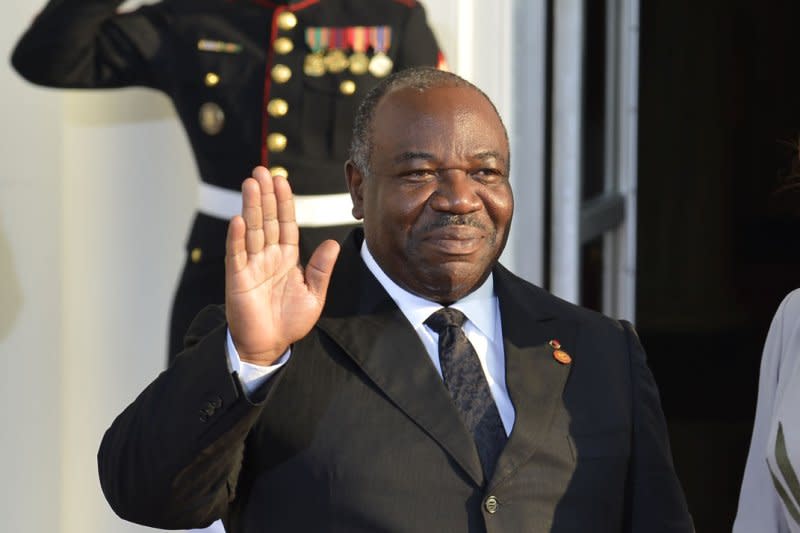After military coup, Gabon's president appeals for support from house arrest

Aug. 30 (UPI) -- Gabon President Ali Bongo Ondimba, in a Wednesday statement from house arrest, appealed to his supporters to "raise your voice" against a military coup after army officers took over the government earlier in the day.
"My son is somewhere, my wife is in another place ... Nothing is happening. I don't know what is going on," Bong said in English before again asking for help.
Bong's son was arrested by the military junta, which said he will be investigated for treason.
The president's appeal comes as men who claimed to represent "defense and security forces" announced in a TV broadcast Wednesday that they had nullified election results by military force, dissolving Gabon's government, Senate and National Assembly.
Gabon army officers said on Wednesday that they had taken control of the country after its election commission said President Ali Bongo Ondimba had won re-election.

Coup leader Gen. Brice Oligui Nguema told French newspaper Le Monde that the military coup will elect a new leader and said he hadn't "yet" declared himself president.
African Union Commission Chair H.E. Moussa Faki Mahamat strongly condemned the "attempted coup d'état" in a statement and called for a rapid return to democratic constitutional order in Gabon.
He said it constitutes "a flagrant violation of the legal and political instruments of the African Union, including the African Charter on Elections, Democracy and Governance."
In a brief statement late Wednesday, U.S. State Department spokesman Matthew Miller said the Biden administration is "deeply concerned" over the events in Gabon and remains "strongly opposed to military seizures or unconstitutional transfers of power."
"We urge those responsible to release and ensure the safety of members of government and their families and to preserve civilian rule," he said, while calling on all involved to show restraint and respect for human rights "and to address their concerns peacefully through dialogue."
He continued that the United States notes with concern the lack of transparency and reports of irregularities with the recent election, while stating, "the United States stands with the people of Gabon."
Men who claimed they represented "defense and security forces" announced in a televised broadcast Wednesday that the election results would be nullified and the country would close its border.
"On behalf of the Gabonese people and guarantor of the protection of institutions, CCTRI [the Committee for the Transition of Restoration of Instiutions] has decided to defend peace by putting an end to the regime in place," they said in the broadcast.
"All the institutions of the republic are dissolved: in particular the government, the Senate, the National Assembly, the Constitutional Court, Economic and Social and Environmental Council and the Elections Council of Gabon."
Ali Bongo was declared the winner of a disputed election in the oil-rich central African nation. His father had been in power there for 41 years before this election.
Bongo was educated in France and his father's government was pro-French despite high levels of resentment against France in Gabon.
Duke University African studies expert Professor Stephen Smith said the popular perception in Gabon is that the French are still "pulling the strings" in Gabon.
An unnamed junta spokesperson also said during a state TV broadcast that Bongo was being kept under house arrest and surrounded by his "family and doctors."
Gunfire was heard in the streets of the capital following the announcement as celebrations also took place.
Opponents of Bongo argued that the election, where the president won nearly two-thirds of the vote, was fraudulent.
The main opposition challenger, Albert Ondo Ossa, had rejected the voting results, citing what he called election irregularities despite officially getting 30.88% of the vote.
If the coup is successful, it would break 53 straight years in power for Bongo's family.
Bongo's father, Omar Bongo, came into power after Gabon won its independence from France in 1967 and stayed in control of the country until his death from cancer in 2009. His son served as the country's defense minister and foreign minister before taking over as president upon his father's death.
Gabon, poverty-stricken yet oil-rich, would become the eighth former French colony in Africa to experience a coup over the past three years.
Gabon's upheaval comes on the heels of Niger's military taking control of that country last month. In that instance, the African Union suspended Niger's membership in the group of 55 member states. It also closed its borders after the coup.
Niger's coup leaders said earlier this month that the country could return to democracy after three years following a meeting with a delegation of West African leaders who have threatened military intervention.

 Yahoo News
Yahoo News 
